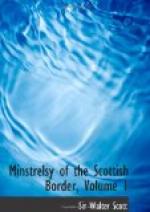James Hop Pringle of Torsonse.—P. 97. v. 1.
The honourable name of Pringle, or Hoppringle, is of great antiquity in Roxburghshire and Selkirkshire. The old tower of Torsonse is situated upon the banks of the Gala. I believe the Pringles of Torsonse are now represented by Sir James Pringle of Stitchell. There are three other ancient and distinguished families of this name; those of Whitebank, Clifton, and Torwoodlee.
He bids ye mete him at Permanscore.—P. 98. v. 1.
Permanscore is a hollow on the top of a high ridge of hills, dividing the vales of Tweed and Yarrow, a little to the east-ward of Minch-Moor. It is the outermost point of the lands of Broadmeadows. The Glenriddel MS., which, in this instance, is extremely inaccurate as to names, calls the place of rendezvous “The Poor Man’s house,” and hints, that the Outlaw was surprised by the treachery of the king:—
“Then he was aware of the king’s
coming,
With hundreds three in company,
I wot the muckle deel * * * * *
He learned kings to lie!
For to fetch me here frae amang my men,
Here like a dog for to die.”
I believe the reader will think, with me, that the catastrophe is better, as now printed from Mrs. Cockburn’s copy. The deceit supposed to be practised on the Outlaw, is unworthy of the military monarch, as he is painted in the ballad; especially if we admit him to be King James IV.
Fair Philiphaugh is mine by right.—P. 101. v. 1.
In this and the following verse, the ceremony of feudal investiture is supposed to be gone through, by the Outlaw resigning his possessions into the hands of the king, and receiving them back, to be held of him as superior. The lands of Philiphaugh are still possessed by the Outlaw’s representative. Hangingshaw and Lewinshope were sold of late years. Newark, Foulshiels and Tinnies, have long belonged to the family of Buccleuch.
JOHNIE ARMSTRANG.
* * * * *
There will be such frequent occasion, in the course of this volume, to mention the clan, or sept, of the Armstrongs, that the editor finds it necessary to prefix, to this ballad, some general account of that tribe.
The Armstrongs appear to have been, at an early period, in possession of great part of Liddesdale, and of the Debateable Land. Their immediate neighbourhood to England, rendered them the most lawless of the Border depredators; and, as much of the country possessed by them was claimed by both kingdoms, the inhabitants, protected from justice by the one nation, in opposition to the other, securely preyed upon both.[110] The chief was Armstrong of Mangertoun; but, at a later period, they are declared a broken clan, i.e. one which had no lawful head, to become surety for their good behaviour. The rapacity of this clan,




